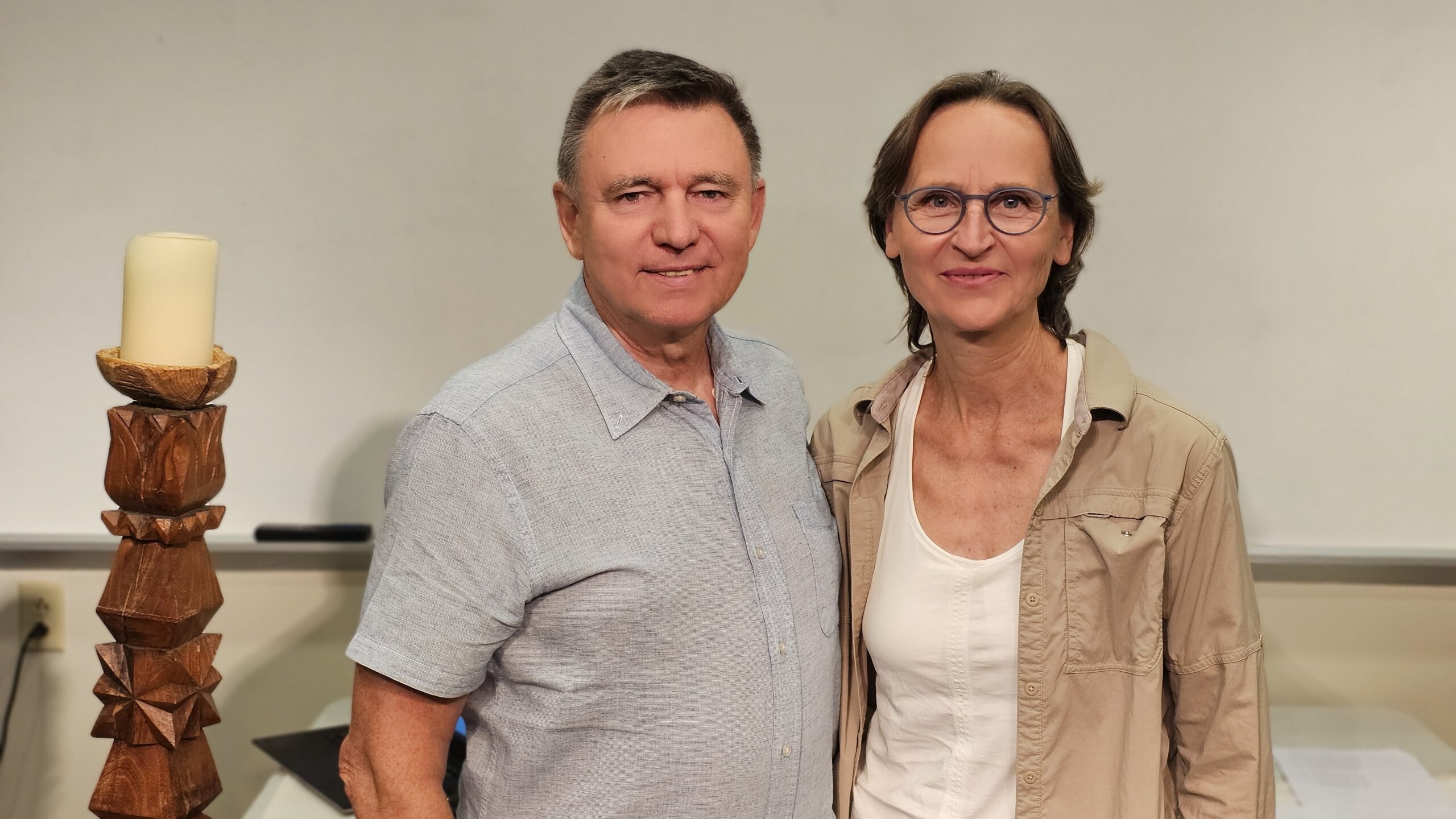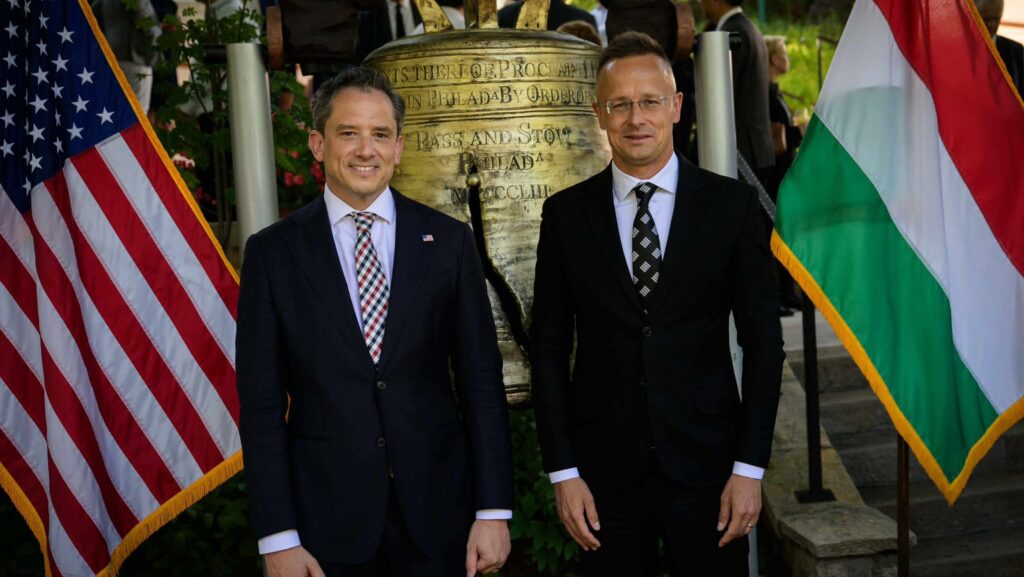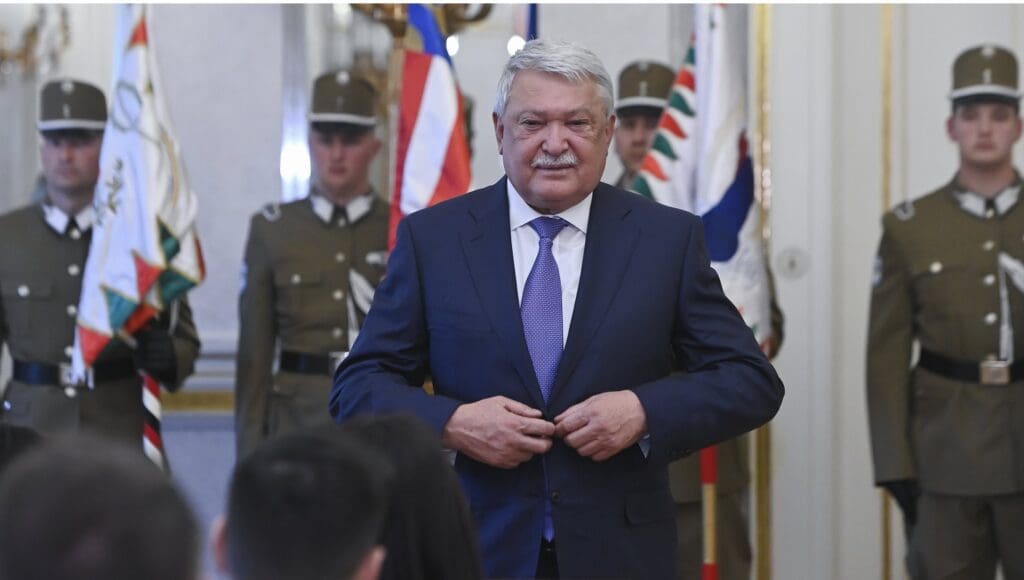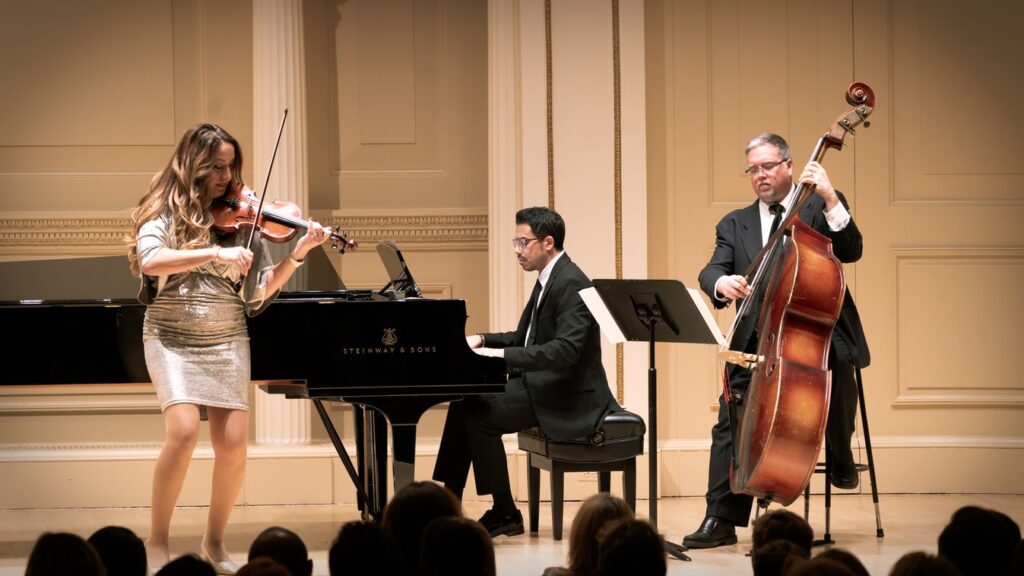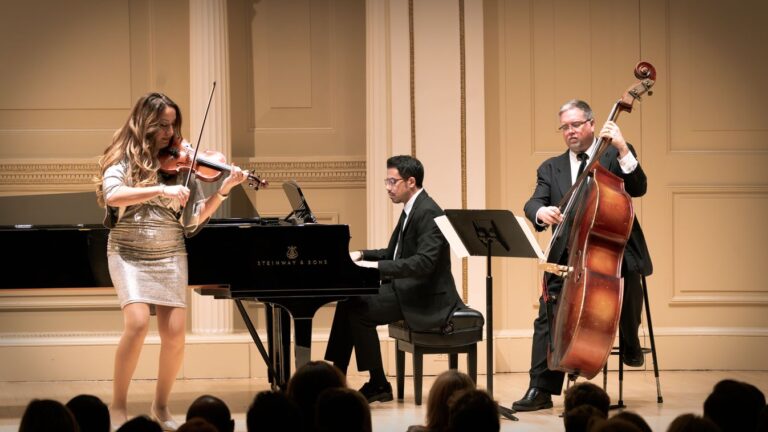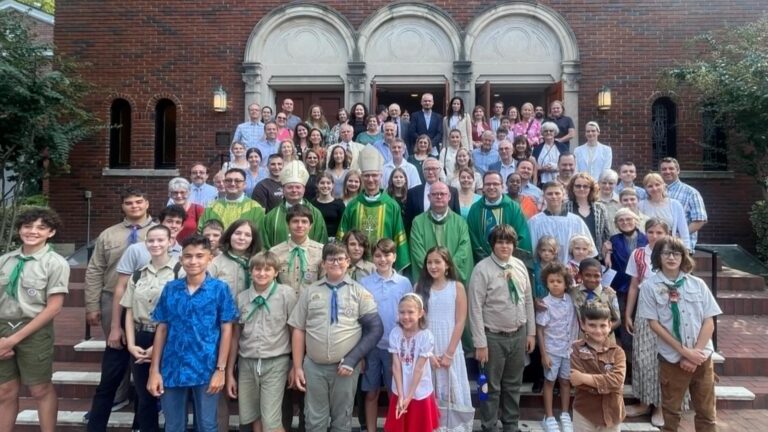Every August since 1975, the Hungarian Communion of Friends (Magyar Baráti Közösség, MBK) has held its annual ITT-OTT (Here-There) Conference at Lake Hope State Park in Ohio, providing an opportunity for Hungarian American families to vacation together and be part of intellectual and cultural programs aimed to recharge the ‘Hungarian spirit’ of the participants for another year. This year’s event was led by József Megyeri as president, along with his wife, Erika, who had previously also served for six years as president of the organization.
***
When and how did you come to the U.S.?
József: I was born and spent my childhood in Magyarcsernye, an ethnic Hungarian village in the Banat region of then Yugoslavia (today’s Serbia). My sister married a Hungarian American man in 1968, who visited his homeland in search of a wife. After meeting and then corresponding for a year, he proposed to my sister in a letter. Four years after their wedding, my parents visited them, and in order to prevent me from following my sister and leaving them behind, my parents decided to move to Chicago in July 1974. I was 16 at the time, and from September I attended an American high school without any initial knowledge of the English language. Erika was my classmate. They settled in the same neighborhood at the same time…
Your lives intertwined quite early… Erika, where did you come from and why?
Erika: My father’s family was separated after the war: my uncle, the sculptor István Bokor ended up in Budapest, while my father stayed in Marosvásárhely (Târgu Mureș, Romania) with my grandmother. After the 1956 revolution, my uncle fled with his family to Vienna, Austria and then immigrated to Chicago. My father repeatedly applied to the Romanian communist authorities for permission to visit his brother. When he finally managed to get out of Romania in 1972, he immediately applied for political asylum in the U.S. This time period was very stressful and full of uncertainty for my mother, because of not knowing whether they would allow us to follow him. As a factory worker, she was extremely skilled in sewing leather gloves, but after my father’s departure, she immediately lost her job. In order to make ends meet, she altered and made new dresses from our home and traded our apartment for a smaller one for additional income. To our great relief, we were allowed to join our father in the U.S. two years after he left.
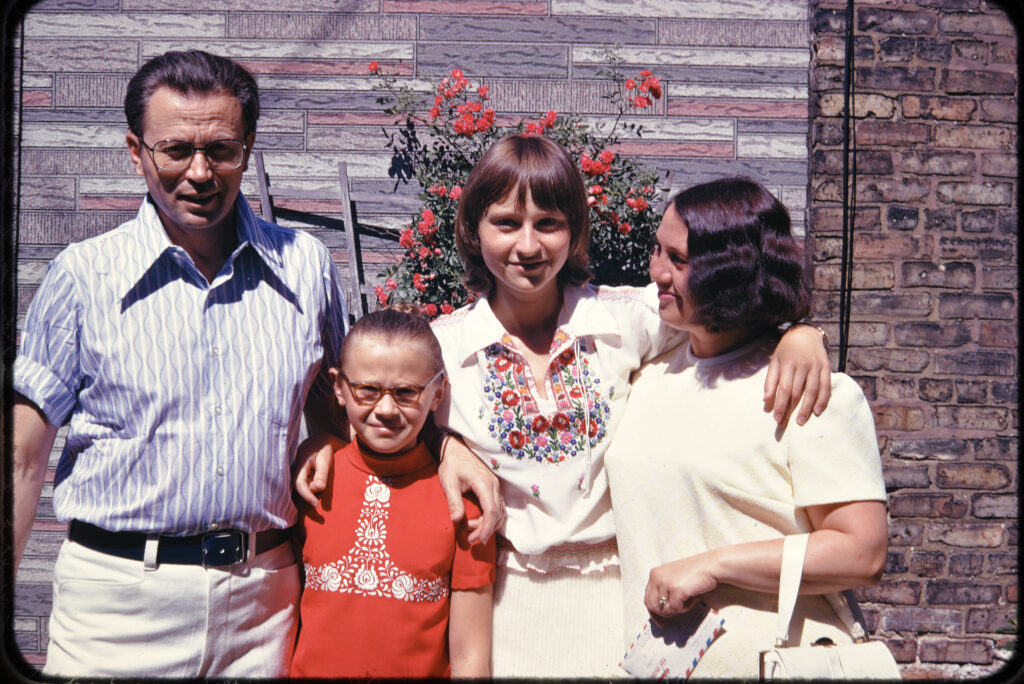
What did your parents do in America?
Erika: My uncle became a foreman for a project at Brookfield Zoo in Chicago, and he was able to hire my dad for that project. My mother was hired by a Hungarian woman who provided alterations from her home to wealthy American clientele. She took over the business when the owner retired. In the mid-1980s she was brave enough to open her own tailor shop. which became a very successful business. In the mid-1990s, she became seriously ill, and decided to move her business to our home, where a room addition provided space for her to receive her customers for years to come. Fortunately, the cancer surgery saved her life, and we were lucky enough to have her with us for another 23 years, until she died at the age of 82.
József: My father was a successful master carpenter with his own workshop back home. My mother was a homemaker primarily, but also helped with the workshop administration. When we came to the U.S., it was my father’s dream to open a workshop with his son, but I was more interested in computer science and electrical engineering. Within days of arriving, he got a job in an upscale workshop through the Hungarian community, serving elite neighborhoods of Chicago, where he worked as a master carpenter until his retirement. My mother became a factory worker in a sewing shop. After retirement, they looked after our then young daughter, Csilla.
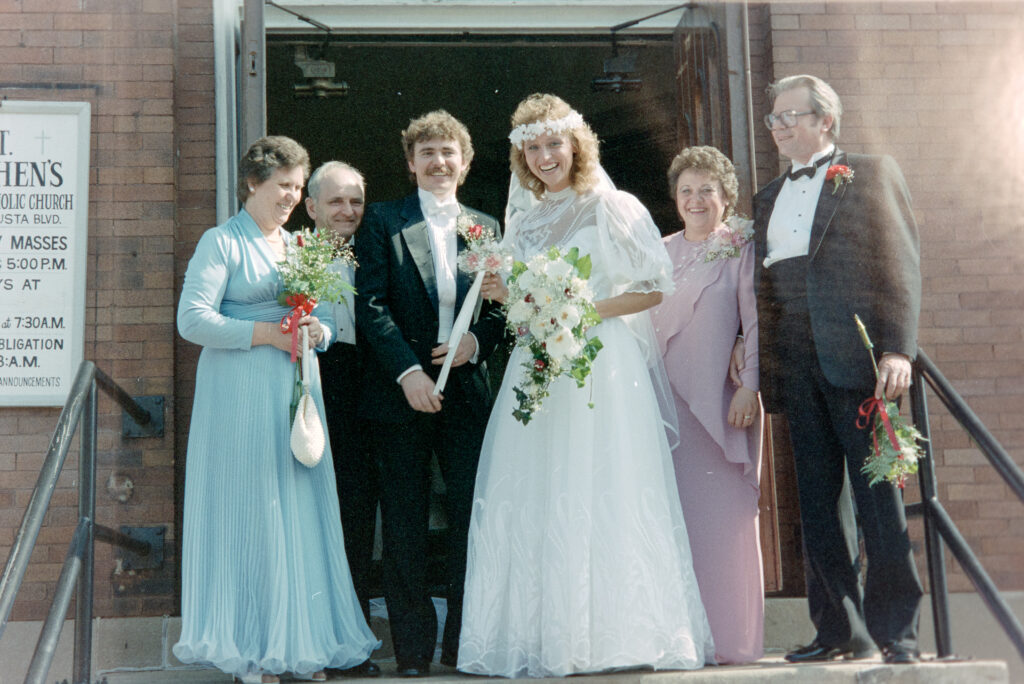
How did you get involved in Hungarian community life?
Erika: My uncle’s family had a huge library and were very supportive of Hungarian causes, but weren’t very active in the Hungarian community. My dad and I discovered a flyer about the local Hunyadi Mátyás Scout Troop in the window of a Hungarian instrument repair shop across the street from the high school I was about to attend, and he contacted them. I began to attend regular weekly meetings during that fall, where our enthusiastic scoutmasters, Béla and Melinda Kovács, instilled in us
a strong interest in our Hungarian roots and taught us to value the gift that belonging to two cultures provides for us.
They also taught us about Hungarian history and culture, including many folk songs, which I didn’t have the opportunity to learn in communist Romania.
József: My sister and her husband, on the other hand, were very active in the local Hungarian community, especially in St. Stephen’s Catholic church, and I got involved through them. The church still stands today, but unfortunately it no longer has a Hungarian priest since 2015. It would have been closed, but the parishioners successfully managed to keep it open by obtaining a Catholic Mission status, serving the wider Hungarian Community of Chicago. Back in the 1970s, the church was always full on major holidays. Many large community events, celebrations and balls were held in its large community room downstairs, below the sanctuary. It was there that I got to know and join the scouts. My very first camp experience was the 1975 Jamboree with nearly two thousand scout attendees. We were so inspired there by the folk-dance performance of the Regös group from Cleveland, Ohio that we established the Rábai Folk Dance Ensemble in Chicago.
Erika: Károly Németh, who became the leader of our group, used to dance professionally in Budapest. There he danced with Kálmán Magyar, who became the lead engine of the Hungarian folk-dance revival movement in the U.S. from the 1970s. There were 15–20 of us, and we practiced twice a week for 2–3 hours each time, performed at a variety of festivals and events, and even appeared on local TV. The weekly scouting and twice weekly folkdance practices occupied all of our free time. I was also in a swim team. I don’t even know when I had time to study…
What else are you doing besides leading the ITT-OTT Conferences?
József: Scoutmaster Gyula Nádas Sr. helped me get my first job when I was still in high school, launching me on my current career path. I became the director of an electrical engineering firm with strong IT emphasis and held that position until two weeks ago, up to my semi-retirement. Currently I am working in an advisory contract position serving the life sciences industry. Hopefully, in my new position, we’ll have more time to visit the National Parks, as this is our main bucket list item besides continuing to be active in the Hungarian Community.
Erika: I am a psychologist. Before our daughter Csilla was born in 1990, I worked at a large hospital, but I gave that up to reduce my working hours. I went into private practice, which proved to be a great decision because it allowed me to flexibly shape my professional life in order to focus more of my energy on our family. This also allowed Józsi to remain the main breadwinner… (laughs) I often say: if I had invested as much time into my paid work as into community work, I would probably have a fortune by now… After our daughter was born, we became more active within the scout troop once again to make sure it became part of her life as well: Józsi as board president, and myself as assistant at various programs including summer camps, where I taught grammar and helped in the camp kitchen. Csilla has been a scout since she was very young and danced for two years in the Toborzó folk dance group, where her generation participated.
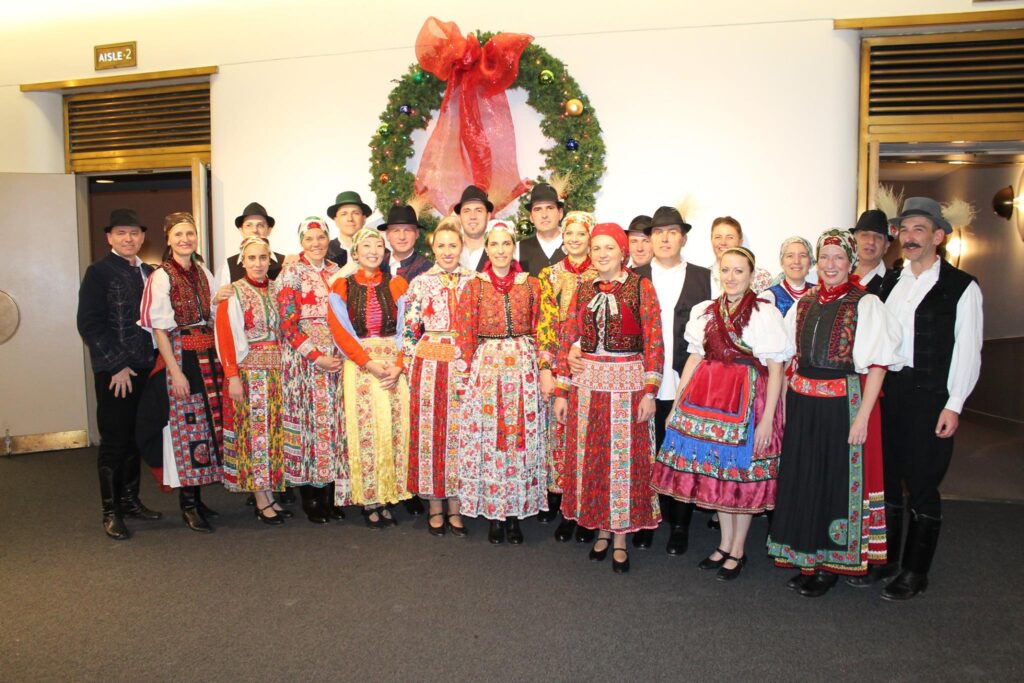
József: We are among the founding members of the Borozda Folk Dance Ensemble established 14 years ago. Currently I’m its president, and we still try our best to dance… (laughs) Since the early 1990s, we have also been board members of the now 102-year-old Hungarian Club of Chicago, whose current president is Gábor Mózsi, and I’m the financial director. I remember bringing our young daughter to meetings held at various private homes, since unfortunately we don’t have a Hungarian clubhouse in Chicago. The Club’s goal of community building is achieved through four annual events: an annual general meeting in the spring, a summer picnic, a St. Nicholas luncheon, and an elegant gala ball in the late winter, where 30 years ago typically 600–700 people attended. Currently, the number of attendees fell to about half of that, but the event is still going strong. Additionally, in conjunction with other organizations, we have established the Cultural Council, an umbrella organization to coordinate our cultural activities in the Chicago area. There are two Reformed (Calvinist), one Catholic and one Baptist denominations. The most populous is the Baptist and the Norridge United Church of Christ, where 40–50 people are present regularly. The Catholic church provides a home for joint celebrations of our national holidays, although it has only 10–20 people attending weekly masses, as does the other Reformed church. I’m Catholic, Erika is Reformed, and we support both churches, but mainly attend Norridge.
Erika: We no longer have enough members in our community to do things separately.
We have to support each other.
The two-day Gulyás Festival is the biggest event, organized by the Norridge community of Rev. Áron Trufán, which attracts over 2,000 visitors of various nationalities, including Poles, Romanians, and Serbs. Volunteers from all Chicago areas contribute to the success of this event, both during the week-long preparation process and the event itself. Vice versa, the Norridge community is there to support other local community events, providing tents, ice and helping hands. The Baptist church does not usually get involved in community events, except at national holidays and during Advent, which they often spearhead and join other churches in ecumenical celebrations.
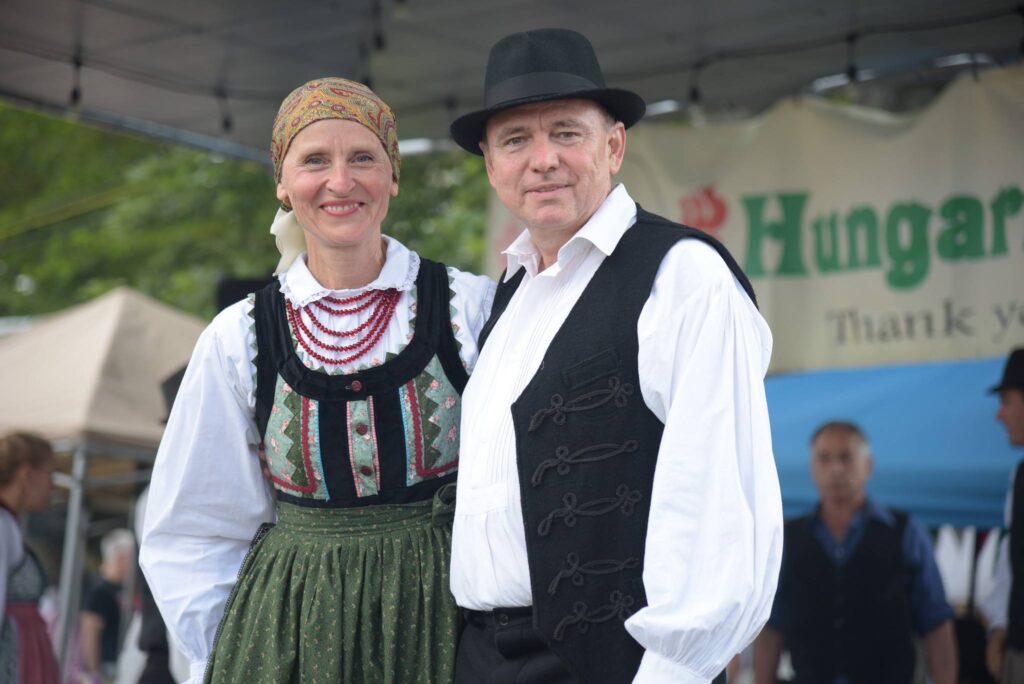
Finally, let’s talk about the ITT-OTT. When did you get involved?
Erika: We first attended the second ITT-OTT Conference held at Chautauqua Lake in New York State in 1975. On our way back from the mentioned Scout Jamboree, the Kovács family stopped there with us. We were very impressed by how respectful everyone was of each other, even when strongly disagreeing, and they warmly welcomed us, new teenagers. We were happy to listen to interesting presentations and it was very easy to feel like we belonged there.
József: The following year founders András Ludányi and Lajos Éltető established the first Summer Hungarian University in Portland, Oregon where Lajos was head of department and András was a professor. The Hungarian American Foundation gave us a scholarship to cover our travel expenses. We spent two months there, and we had lectures every day about Hungarian literature, grammar, history and politics. We even got university credits. It was a tremendous opportunity for us to get to know each other better, to get a sense of the larger Hungarian American community, and to realize that there is a larger network out there beyond Chicago.
Erika: After completing the summer university, we of course visited ITT-OTT again, where it had just been decided to create a position of youth board member. I was the first to fill that position. Over the years, many of our peers from Chicago and the East Coast joined us. We even rented cabins together with friends like Károly Jókai, now executive director of the Fulbright Scholarship, and his older sister Kinga, who is now a pediatrician in Budapest. His sister Judit is the current scoutmaster in Chicago. Founder Tibor Cseh’s daughter Tücsi was also a good friend of ours, as was the other founder, László Bőjtös’ older daughter, Anita. There were years when we had over 20 people of our age attending…
What attracted you here?
Erika: There were a lot of talks about multiple aspects of life in the Hungarian American diaspora, which interested me, and so did literature,
since open conversations about literature and national dilemmas were out of the question in Romania.
We enjoyed being able to talk freely about such matters. We also appreciated being able to contribute to the program and participate in the lectures every year. For a long time, the focus was on literature and folklore, but over the years, the emphasis changed, and the content became a bit more focused on politics. There was also a self-educational character to the gatherings, which was perhaps its most distinctive feature: the informal dialogues by the lakeside and at the campfires, where we could chat with the lecturers and performers.
József: Before the regime change, MBK’s mission and its relationship with artists, writers and poets from the Carpathian Basin was especially strong. We invited and hosted famous poets and writers like Sándor Csoóri, András Sütő, Sándor Kányádi, Mihály Czine, György Faludi, and received a great deal of spiritual nourishment from them. At the same time, they also drew renewed strength from the community that was here to support them. László Bőjtös, who became the first Honorary Consul of Hungary in the U.S. in 1993, spearheaded our mission to send our guests to several Hungarian communities across North America. It was a great experience for them, and it was a great feeling for us knowing that so many members of the Hungarian American community could enjoy their presentations.
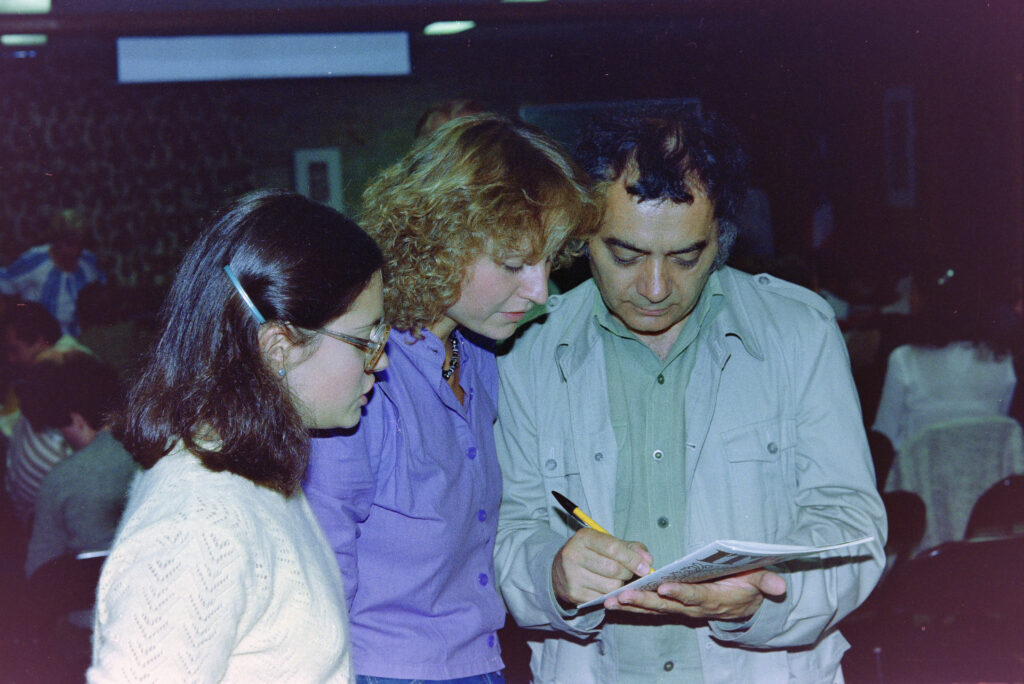
There’s still a misconception that only collaborators were allowed to leave communist Hungary or Romania for similar North American visits…
József: Unfortunately, that’s true. For example, many years ago, there was a man in the Chicago area who made seals stating that ‘MBK is the shame of Hungarians’ because he considered us to be communists. He would stamp all of our flyers with that seal and mail them to us. But I don’t know of anyone visiting us who would have informed us to the communist government, nor do we have any stories of communist agents infiltrating our gatherings. Perhaps our guests were allowed to travel to the U.S. because they were well-known and popular, and the Romanian or Hungarian communist governments were trying to present themselves as friends of America. On the other hand, there were various dance groups coming every year from communist Hungary, along with some ‘entourage’, and it was well understood that there was always someone with whom we had to be careful…
How did Erika (or, actually, both of you) revive the ITT-OTT Conferences?
Erika: Lajos Éltető asked me in 2000 to consider becoming president, but I declined, because I felt it was important to focus on our family life. By 2006 I accepted the invitation. In light of declining attendance, there were talks about the future of our conferences. Some felt that we should consider closing the door, while others suggested we should consider changing the format to a week-end, hotel-based conference. During my six years we did our best to prevent this from happening. We aimed to refresh the nature of the conference by bringing in multimedia and interactive presentations and hands-on folk-art related activities. We conducted several surveys on what attracts our members, and shaped the program based on feedback to include more crafts, folk music and lectures on literature and folklore.
József: We implemented several new innovations, establishing MBK’s internet and social media presence. In the late 1980s over 200 people attended; by 2005 only around 40–50. By 2012, we were glad to see that the number of attendees grew to 160–180. In 2020 we held a virtual three-day conference and in 2021 we resumed our regular in-person conferences, but only with about 50–60 participants. Last year’s numbers were still low, so we started talking again about whether it made sense to continue at all…
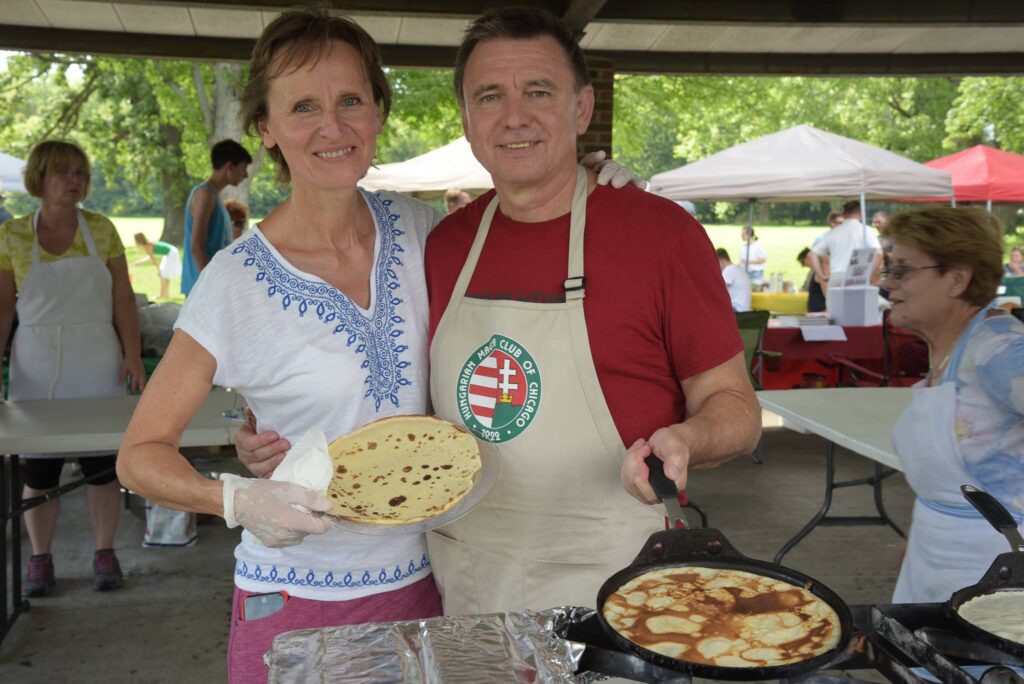
This time József was the ‘rescuer’, but the work is again done by both of you.
József: Some board members felt we should close the door with dignity, and have this year’s conference be the last one. I felt it was time to step in and see whether it’s possible to prevent this from happening. I’m happy to see that this year’s participant numbers have risen to 80. One of my biggest goals is to attract even more young families and individuals. This year’s main performance is Ketten a versben (Two in the Poem) with actors Mariann Tallián and Balázs Lázár, and Belvárosi Betyárok musicians, all from Hungary. We hope to improve on how widely and how soon we advertise our program and overseas guests, based on feedback that many more would have come if they had known earlier about these wonderful offerings…
Erika: The problem is that currently Józsi is practically the only one on the board who handles the technology-based logistics part of the organization. We need to involve board members who can help out with some of those things, and he also needs to learn to delegate. We are happy to see younger leaders on our board, and we hope to attract more. We also need to invite young performers, especially musicians, and lecturers focusing on current cultural topics. Not everyone is familiar with younger artists and some prefer more politics and history as content, but I trust that we can find the right balance for today’s audience.
József: Generally, we must learn to admit that we need more help with organizing and promoting the event earlier. It was fantastic how everyone jumped in to help at this year’s conference, from registration to selling T-shirts. We are very grateful to all of them. I feel there is a renewed interest in moving MBK forward together. The younger generation started to be physically here at least for a couple of days, and they are interested in sharing the ITT-OTT experience as well as the work.
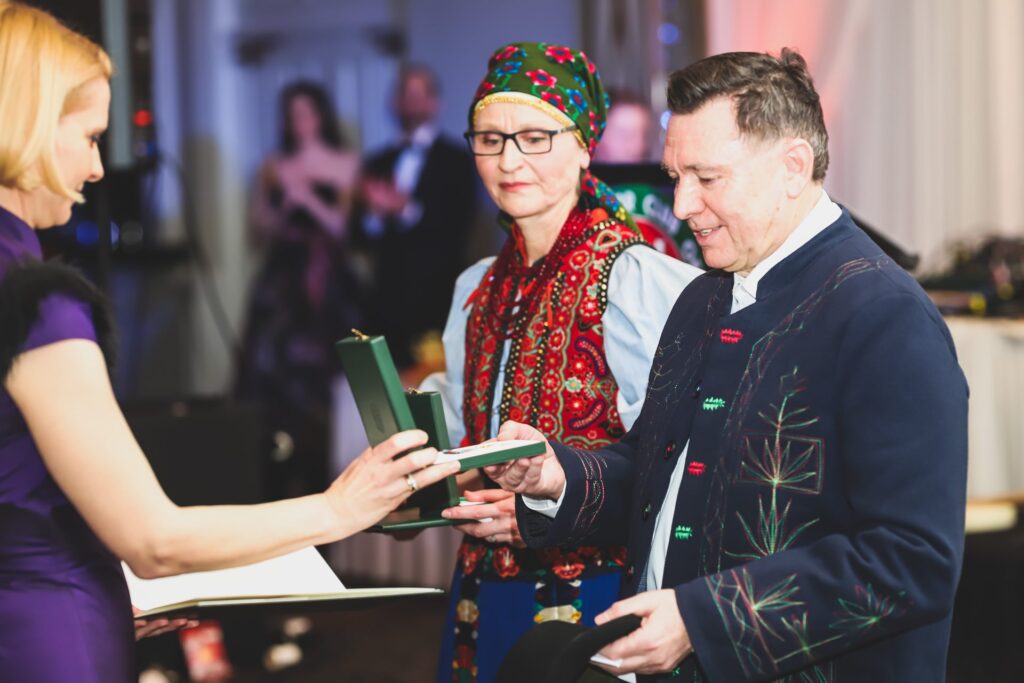
What plans do you have for the future?
József: Next year’s ITT-OTT Conference date is August 3–10, 2025. We booked all 45 cabins for our venue, and we are confident that we will be able to fill all of them. My biggest goal for next year is to attract high quality performers and presenters from a younger age group with a commitment to this community, wanting to spend the entire week with us. It makes a huge difference if they join us at the beach or campfires, so that we can mutually get to know each other and form lasting relationships. In the past, as László Bőjtös embraced it, we would have our guest performers travel to Hungarian American communities. Sadly, this doesn’t work well anymore due to changing summer schedule patterns, so we need to find new ways to share with the rest of the diaspora what our guests have to offer.
Erika: This year there are quite a few families attending with young children, and there are several spouses of non-Hungarian origin, including Dan, who, by the way, took the Megyeri name when becoming our daughter’s husband, which was very touching for us. As in previous years, we would love to provide English-language lectures held parallel with the main program for individuals like him. We are also open to provide a daily children’s program, which would culminate with a short kid performance and craft exhibit at the end of the week, as in previous years. There seems to be a demand for both, so we’ll probably plan these for next year, but only if we have enough volunteers to undertake them. We warmly welcome any volunteers for these tasks and of course more participants for the next event!
Read more Diaspora interviews:

